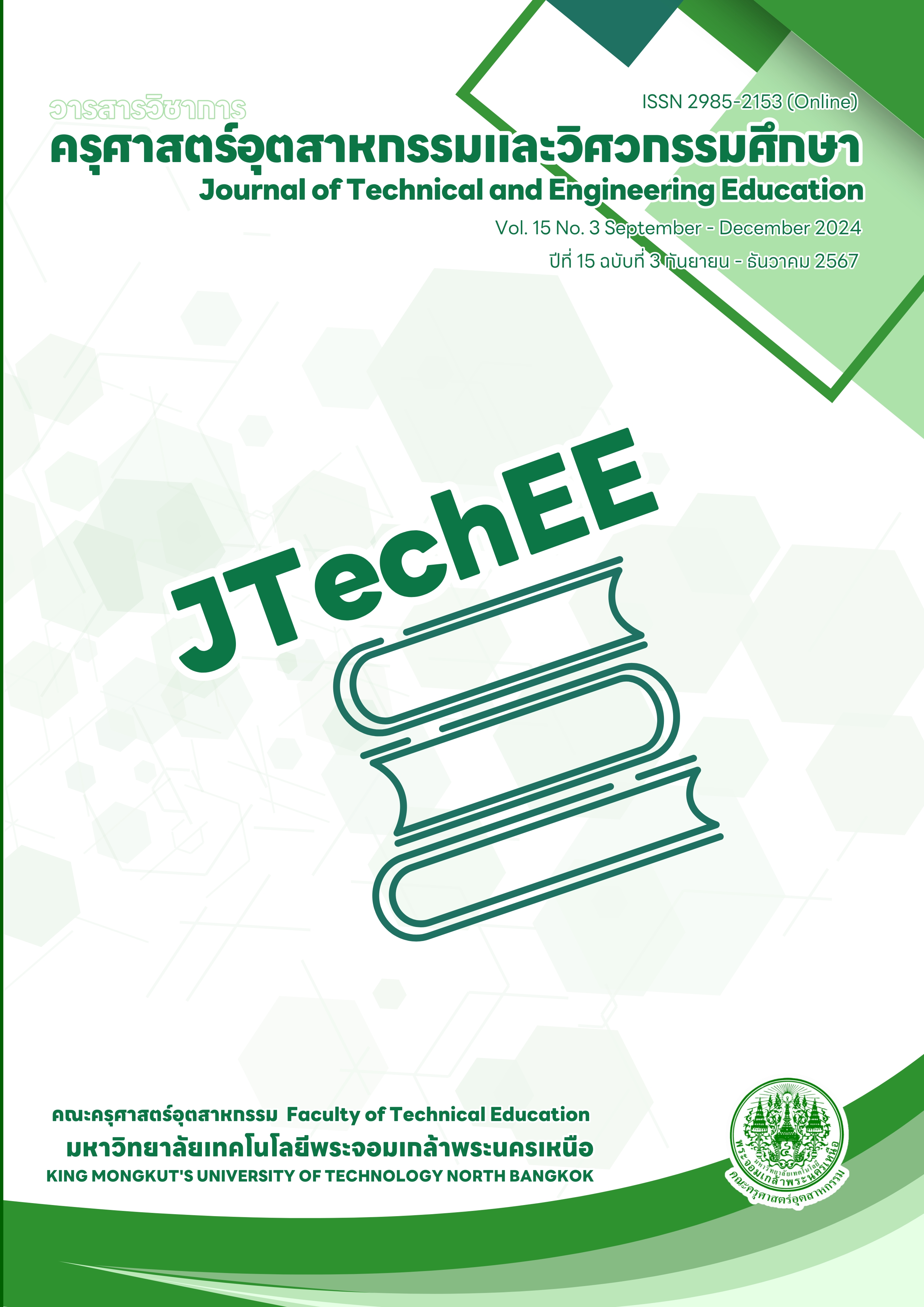Development of the flipped classroom coupled with the utilization of cloud computing to Enhance students’ problem-solving abilities in computational science
Main Article Content
Abstract
The aims of this research study are 1) To create a learning management process in the form of a flipped classroom combined with the use of cloud computing for technology subjects (Computational Science) to enhance problem-solving abilities of students. 2) To evaluate the effectiveness of the flipped classroom learning arrangement combined with the use of cloud computing according to the efficiency criteria of 80/80. And 3) To compare the problem-solving ability of Mathayom 2 students after studying with the flipped classroom approach, with a target improvement of 80%. The research was conducted using a single-group experimental research design. The sample consisted of 20 Mathayom 2 students at Ban Plaeng Si School, obtained through Purposive Sampling. Statistics used in data analysis included mean, standard deviation, and t-test.
The research results found that 1) Development of a Flipped Classroom Learning Management Process in a four-step flipped classroom learning management process utilizing cloud technology. These steps involve Step 1 Experiential Engagement Step 2 Concept Exploration Step 3 Meaning Making and Step 4 Demonstration & Application. The process leverages two cloud computing service models is infrastructure as a service (IaaS) and software as a service (SaaS). 2) Effectiveness of the Flipped Classroom Approach The combination of flipped classroom learning management and cloud technology effectively Enhance problem-solving abilities in Mathayom 2 students. The efficiency criteria of 80/80 were surpassed, with a score of 89.93/81.00 and 3) Improved Problem-Solving Ability Mathayom 2 students who studied with the flipped classroom and cloud computing approach demonstrated significantly higher problem-solving abilities compared to the 80% threshold. This improvement achieved statistical significance at the 0.05 level.
Article Details

This work is licensed under a Creative Commons Attribution-NonCommercial-NoDerivatives 4.0 International License.
copyright in this website and the material on this website (including without limitation the text, computer code, artwork, photographs, images, audio material, video material and audio-visual material on this website) is owned by Journal and its licensors.
References
Academic Department. (2022a). Report of the PLC meeting, Science and Technology Subject Group, Academic Year 2022. Kamphaeng Phet: Ban Plaeng Si School. [in Thai]
Academic Department. (2022b). Self-Assessment Report (SAR) Academic Year 2022. Kamphaeng Phet: Ban Plaeng Si School. [in Thai]
Chaonahee, S. & Cojorn, K. (2021). Development of Problem-based Learning Activities Incorporated with Flipped Classroom to Promote Physics Learning Achievement and Problem-Solving Thinking Ability of Mathayom suksa 4 Students. Rajabhat Mahasarakham University Journal, 15(2), 210-218. [in Thai]
Hemmarak, M., Aumgri, C., & Apirating, K. (2023). Flipped Classroom Learning Process by Using Cloud Learning to Enhance Information Media and Technology Skills for Pre-Service Teachers. Journal of Southern Technology, 16(2), 25-37. [in Thai]
Huanarom, Y. & Daman, A. (2022). The Development of Chinese Listening and Speaking Skills by Using Flipped Classroom through Zoom Meeting. Journal of Humanities and Social Sciences Burapha University, 30(1), 135-157. [in Thai]
Institute for the Promotion of Teaching Science and Technology (IPST). (2017). Organizing learning content for the science group in the basic education curriculum. Bangkok: Institute for the Promotion of Teaching Science and Technology. [in Thai]
Janpen, P. & Promkhot, P. (2023). Flipped Classroom for English Language Teaching. Journal of Education Valaya Alongkorn Rajabhat University, 1(1), 1-11. [in Thai]
Meesuwan, W. (2018). Effects of using social network with flipped classroom to support communication skills. Journal of Education Naresuan University, 20(3), 162-172. [in Thai]
Na Lampang, C. & Saejoo, P. (2017). The Development of Instructional Process of Flipped Classroom with Problem Solving via Social Network Edmodo. Journal of Education Graduate Studies Research, KKU, 11(3), 48-58. [in Thai]
National Institute of Educational Testing (Public Organization). (2022). Report on basic national educational testing results, academic year 2022. [in Thai]
Office of Educational Testing. (2023). Manual for using the tool to assess important student competencies According to the Basic Education Core Curriculum, B.E. 2008 (revised edition 2017). Aksorn Thai Printing House. [in Thai]
Pattaragorranan, N. (2023). Computing science skill development using creative game activity of graduate students faculty of education, Bankok thonburi University. Journal of Nisitwang, 25(1), 65-74. [in Thai]
Prathumdee, P. (2021). Development of flipped classroom learning activities combined with web-based lessons on 2D motion to promote analytical thinking abilities for Mathayom 4 students [Master of Education thesis]. Mahasarakham University. https://shorturl.at/huKOV [in Thai]
Sarnok, K. (2016). Development of 21st Century Learning Skills for Gen Z Learners Using AL Teaching. In Symposium: Education for 21st Century Skills (pp. 301-312). Nakhon Ratchasima: Chateau de Khaoyai Hotel & Resort, Nakhon Ratchasima Province. [in Thai]


